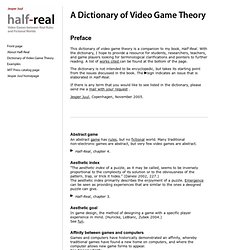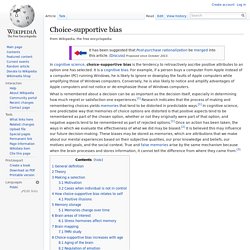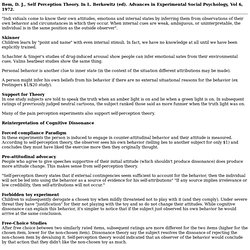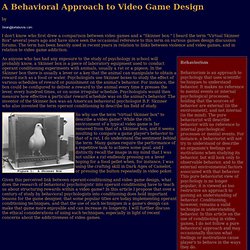

A Dictionary of Video Game Theory. Preface This dictionary of video game theory is a companion to my book, Half-Real.

With the dictionary, I hope to provide a resource for students, researchers, teachers, and game players looking for terminological clarifications and pointers to further reading. Choice-supportive bias. In cognitive science, choice-supportive bias is the tendency to retroactively ascribe positive attributes to an option one has selected.

It is a cognitive bias. For example, if a person buys a computer from Apple instead of a computer (PC) running Windows, he is likely to ignore or downplay the faults of Apple computers while amplifying those of Windows computers. Conversely, he is also likely to notice and amplify advantages of Apple computers and not notice or de-emphasize those of Windows computers. General definition[edit] The tendency to remember one’s choices as better than they actually were, where people tend to over attribute positive features to options they chose and negative features to options not chosen.[1] Theory[edit]
The Psychology of Video Games. Www.digra.org/dl/db/09287.52575.pdf. Social Games Do Psychology the Best.
Bem: Self Perception Theory. Bem, D.

J., Self Perception Theory. In L. Berkowitz (ed). Benign vs Malicious Jealousy Posted on Sep 05, 2011 by Michael Gugel in Gaming, Psychology Benign vs Malicious Jealousy People expect the world to be fair.

If you work hard, you’ll be rewarded for your efforts. If you’re lazy, you won’t get much. Www.bunchball.com/sites/default/files/white_papers/bunchball_gamification_at_work.pdf.
Self. Learning to Love Your AP History Assignments: How to Hack the Psychology of Student Motivation. {*style:<b>The War Against Extrinsic Motivation </b>*} In 1999, Alfie Kohn , an education writer described by magazine as “perhaps the country’s most outspoken critic of education’s fixation on grades,” published an article in titled “From Degrading to De-Grading.” It listed many arguments against grades, but its first is the most repeated: As Kohn explained: “One of the most well-researched findings in the field of motivational psychology is that the more people are rewarded for doing something, the more they tend to lose interest.”
Kohn is referring to the voluminous research on the difference between and motivation. The former describes motivation that comes from rewards or punishments outside the task, like studying to achieve a good grade. The Roberts Method: A Professor’s Advice for Falling in Love With Your Major. November 3rd, 2010 · 32 comments Major Doubts “I’m enrolled to study computer science…a choice that was heavily influenced by my parents.”

So began a recent e-mail — one of many I receive that echo the same theme. “I think that if I continue on in computer science I might find a love for it eventually,” the student said optimistically, before adding: “but a few days ago I saw that the university still has some open slots in the psychology program…” The exams in this student’s computer science courses were getting tougher, and she began to wonder if she had missed her true calling in another field, like psychology. Coaching Questions: Encouraging Divergent (“If”) Thinking. In coachbook: A Guide to Organizational Coaching Strategies and Practices, Agnes Mura and I present a series of “If” questions that encourage a coaching client to expand their horizon and move in new directions with regard to both their thinking and their actions.

This encouragement of divergent thinking and actions is particularly appropriate and timely if a coaching client is mired in a difficult situation and caught up in feelings of helplessness and hopelessness. I present additional “If” questions below that similarly encourage divergence. Parasocial.
Acknowledgement. Theme 1: Avatars and Empathy in video games. Dissertation_revision.doc. Tom Chatfield: 7 ways games reward the brain. Intrinsic & extrinsic. Classical vs Operant Conditioning. Classical and operant conditioning are two important concepts central to behavioral psychology.

More on Behavioural Game Design. Variable Ratio Schedule. Conditioning. By I don't know who first drew a comparison between video games and a "Skinner box.

" I heard the term "Virtual Skinner Box" several years ago and have since seen the occasional reference to this term on various games design discussion forums. Operant conditioning. BF Skinner Foundation - Pigeon Ping Pong Clip. Rat Basketball at Wofford College.
Rats playing basketball (championship game) Psychology of rewards in web design. Categorized in: rewards, fixed rewards, variable rewards, reward schedules, contingencies There are two fundamental types of reward schedules which fundamentally change how rewards are experienced: fixed- and variable reward schedules.

Fixed rewards Fixed rewards are given out at a set time, amount, and type and are opposed to variable rewards, which feel more like random rewards. In computer games, fixed rewards are given out when you complete a level or achieve some other kind of clearly defined goal. Variable rewards are usually given out when killing monsters. In web applications fixed rewards are the most commonly used type of reward as they provide clear goals for users to strive for. The right reward at the right time and amount. Schedules of Reinforcement - Operant Conditioning. In operant conditioning, schedules of reinforcement are an important component of the learning process.

When and how often we reinforce a behavior can have a dramatic impact on the strength and rate of the response. Skinner's Cubicle. The subject knows that their next action might be rewarded regardless if they just received a reward. There's always that chance, and that chance as a reinforcer drives their desire for a subsequent action. This type of conditioning is the driving force behind a successful business: pathological pursuit of pleasure through action.
Disregarding negative aspect models and dependent on the manner of the reinforcer there are two different forms of Variable Ratio distribution: incremental and whole. Hebb.mit.edu/courses/9.29/2004/lectures/matching1.pdf. Dan Ariely: Adaptive Responses. Humans trained to hunger like Pavlov's dogs - 21 August 2003. Humans can be trained to crave food in response to abstract prompts just like Pavlov's dogs, reveals new research. But whereas Pavlov's dogs were conditioned to drool at the sound of a bell, Jay Gottfried and colleagues at University College London, UK, trained humans to yearn for vanilla ice cream and peanut butter at the sight of fractal-based computer images. Importantly, the team also showed that the human brain can put a "brake" on the powerful desire for certain foods once the appetite has been sated. Nostalgia, False Memories, and the ‘Other Half’ Memory is a reconstruction. For a while, the theory on memory was that all of our experiences, perceptions, sensory input, etc. got stored somewhere in our brain as they happened, then sent off to some other part of the brain shortly thereafter for long-term storage.
Like an infinite tape recorder or, perhaps more accurately, a movie of your life, a lifetime’s worth of memories are just sitting there, somewhere in the deep dark recesses of your hippocampus, available for remembering given the right circumstances.
Game Design, Psychology, Flow, and Mastery - Playing to Win Inde. Flow. Welcome to Flow in Games. The Psychology of Video Games. Your Brain on Games: The Hidden Psychology of Gaming. Jesse Schell: Visions of the Gamepocalypse. Habituation - (getting used to something) Features - Persuasive Games: Familiarity, Habituation, and Catchiness. Schema - What Is a Schema. Behaviorism Terms and Concepts.